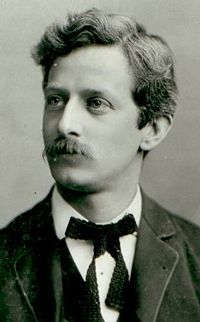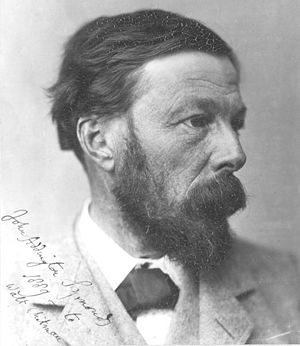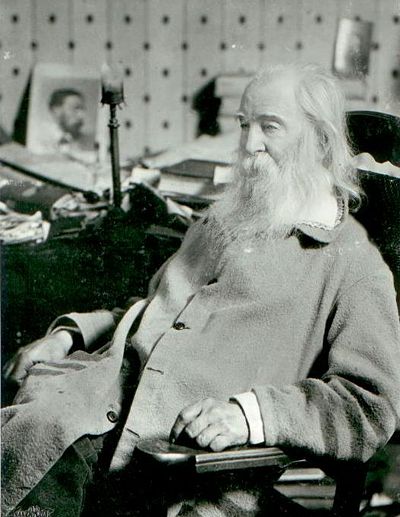Jonathan Ned Katz: "Comrades and Lovers," Act II, Part II
From OutHistory
Jump to navigationJump to searchContinued from: Jonathan Ned Katz: "Comrades and Lovers," Act II
- SCENE TITLE: 7 Horace Traubel, "Whitman asked me"
- HORACE TRAUBEL, GAZING AT STAFFORD AND WHITMAN, HEARS WHITMAN'S LAST LINES. TRAUBEL INTRODUCES HIMSELF TO AUDIENCE
TRAUBEL:
- Horace Traubel.
- Whitman asked me
- about last night's meeting,
- which sat till after 12
- in Philadelphia
- about a dozen men present.
- "Calamus" had been much discussed --
- Sulzberger questioning the comradeship
- there announced
- as verging upon
- the licentiousness of the Greek.
- Whitman took it very seriously:
WHITMAN:
- 70-YEARS-OLD
- He meant the handsome Greek youth
- one for the other?
- I can see how
- it might be opened
- to such an interpretation.
- But in the ten thousand
- who for many years
- have stood ready
- to make any possible charge against me,
- none has raised this objection.
- "Calamus" is to me indispensable--
- LIGHTS UP ON JOHN ADDINGTON SYMONDS WHO, HEARING WORD "CALAMUS, STANDS UP, LOOKING AT WHITMAN WITH GREAT ANTICIPATION
- not there alone
- in that one series of poems,
- but in all.
- It could no more be dispensed with
- than the ship entire.
- SYMONDS MOVES FRONT. TWENTY YEARS AFTER HIS INITIAL INQUIRY ABOUT WHITMAN, HE IS STILL HOTLY PURSUING HIS QUESTIONS ABOUT WHITMAN'S CALAMUS THEME
- SCENE TITLE: 8 John Addington Symonds, "In your conception of Comradeship"
- SYMONDS SPEAKS DIRECTLY AND INTENSELY TO WHITMAN, READY, FINALLY, FOR A SHOWDOWN WITH WHITMAN ON THE SUBJECT OF SEX IN THE INTIMACIES OF MEN WITH MEN
SYMONDS:
- In your conception of Comradeship,
- do you contemplate
- the possible intrusion
- of those semi-sexual
- emotions and actions
- which do occur
- between men?
- I do not ask
- whether you approve of them,
- or regard them
- as a necessary part of the relation.
- But I should much like to know
- whether you are prepared
- to leave them
- to the inclinations
- and the conscience
- of the individuals concerned?
- For my part,
- I hold that the present laws
- of France and Italy
- are right.
- They protect minors,
- punish violence,
- and guard against
- outrages of public decency.
- They leave individuals
- to do what they think fit.
- These principles
- are in open contradiction
- with English and American legislation.
- It has frequently occurred to me
- to hear your "Calamus" poems
- objected to
- as praising
- and propagating
- a passionate affection
- between men
- which might "bring people into criminality."
- I agree that some men,
- having a strong natural bias
- toward persons of their own sex,
- the enthusiasm of your "Calamus" poems
- is calculated to encourage
- ardent and physical intimacies.
- I do not agree
- that such a result
- would be absolutely prejudicial
- to social interests.
SPEAKER 1:
- REPEATING WHITMAN'S EARLIER WORDS
- I do not press my finger across my mouth.
SPEAKER 2:
- REPEATING WHITMAN'S EARLIER WORDS
- I am for those who believe in loose delights
SPEAKER 3:
- REPEATING WHITMAN'S EARLIER WORDS
- All themes stagnate in their vitals,
- if they cannot publicly accept
- and publicly name,
- with specific words,
- those things on which
- all that is worth being here for depend.
SPEAKER 4:
- REPEATING WHITMAN'S EARLIER WORDS
- It is to the development
- of that fervid comradeship,
- the adhesive love
- of man and man,
- that I look
- for the counterbalance
- of our materialistic,
- vulgar
- American democracy.
WHITMAN:
- SPEAKING DIRECTLY TO SYMONDS
- Your questions
- about my Calamus pieces
- quite daze me.
- That the Calamus part
- has opened --
- even allowed --
- the possibility
- of such construction as mentioned
- is terrible.
- I am fain to hope
- that the pages themselves
- are not to be even blamed --
- mentioned --
- for such gratuitous
- and quite
- at the time
- undreamed
- and unreckoned
- possibility
- of morbid inferences --
- which are disavowed by me
- and seem damnable.
- My life,
- young manhood, mid-age
- have all been jolly
- and probably open to criticism.
- Though always unmarried
- I have had six children.
- IMMEDIATELY, WHITMAN'S SIX "SONS" APPEAR AROUND HIM: PETER DOYLE, THOMAS SAWYER, LEWIS BROWN, DOUGLASS FOX, HARRY STAFFORD, EDWARD CATTELL.
- THEN SYMONDS RESPONDS TO WHITMAN, WITH A NOTE OF DISBELIEF AND IRONY
SYMONDS:
- I am sincerely obliged to you
- to know
- so precisely
- that the "adhesiveness" of comradeship has no interblending
- with the "amativeness" of sexual love.
- SYMONDS TURNS AWAY FROM WHITMAN TO SPEAK TO EDWARD CARPENTER
- Whitman did not quite trust me perhaps.
- Afraid of being used
- to lend his influence
- to "Sods."
CARPENTER:
- TO SYMONDS
- Personally,
- having known Whitman fairly intimately,
- I do not lay great stress on that letter.
- Whitman was
- in his real disposition
- the most candid,
- but also
- the most cautious of men.
- TO AUDIENCE
- An attempt was made
- on this occasion
- to drive him
- into some sort of confession
- of his real nature;
- that very effort
- aroused all his resistance
- and caused him to hedge
- more than ever.
- TO SYMONDS
- If Whitman took
- the reasonable line
- and said that,
- while not advocating
- abnormal relations
- in any way,
- he of course
- made allowance
- for possibilities in that direction
- and the occasional development
- of such relations,
- why, he knew
- that the moment he said such a thing
- he would have
- the whole American press at his heels,
- snarling and slandering.
- TO AUDIENCE
- Things are pretty bad here in England,
- but in the states
- (in such matters)
- they are ten times worse.
- SCENE TITLE: 9 Gavin Arthur, "In spite of his 80 years"
ARTHUR:
- ADDRESSING THE AUDIENCE AS A CLOSE FRIEND
- In spite of his 80 years,
- Edward Carpenter's eyes
- were a vivid sky-blue;
- his face was copper,
- his hair shining silver.
- TO CARPENTER
- I was twenty-two.
CARPENTER:
- Welcome, my boy!
- HE EMBRACES ARTHUR, HOLDING THE HANDSOME YOUTH ONE SECOND TOO LONG, KISSING HIM WARMLY ON BOTH CHEEKS
ARTHUR:
- TO AUDIENCE
- He smelled like leaves
- in an autumn forrest.
- A sort of seminal smell.
- CARPENTER MIMES INTRODUCTIONS
- He introduced me
- to his comrade George
- and George's comrade Ted.
- We talked about Walt.
- Carpenter said
CARPENTER:
- Walt would have loved you
ARTHUR;
- the others agreed
- and my heart beat hard.
- After supper Ted suggested
- a walk in the moonlight.
- ARTHUR AND TED WALK OUT TOGETHER
- We talked about Carpenter.
- Then Ted said:
TED:
- Why don't you spend the night?
- It would do Eddy so much good
- to sleep with
- a good looking young American.
ARTHUR:
- I would like nothing better,
- I said.
- We approached the fire,
- before which the Old Man was sitting.
- Ted looked down at him lovingly:
TED:
- Gavin wants to sleep with you tonight, Eddie.
- Ain't you the lucky old dog?
ARTHUR:
- The other two went up to bed.
- The old man and I sat by the fire.
- We talked again of Walt.
- I blurted out,
- half afraid to ask:
- "I suppose you slept with him?"
CARPENTER:
- Oh yes --
- he regarded it
- as the best way
- to get together with another man.
- He thought
- people should know each other
- on the physical and emotional plane
- as well as the mental.
- The best part of comrade love
- was that there was no limit
- to the number of comrades one could have.
ARTHUR:
- "How did he make love?"
- I forced myself to ask.
CARPENTER:
- I will show you.
- ARTHUR SITS STAGE CENTER; CARPENTER IN BACK OF ARTHUR, HOLDING HIM; WHITMAN SITS IN BACK OF CARPENTER. NO SEXUAL ACTIVITY NEEDS TO BE PORTRAYED, THE WORDS ARE POWERFUL ENOUGH
ARTHUR:
- We were both naked.
- We lay side by side
- on our backs
- holding hands.
- Then he was holding my head
- in his two hands,
- making little growly noises,
- staring at me in the moonlight.
- "This is the laying on of hands,"
- I thought.
- "Walt.
- Then Edward.
- Then Me."
- The old man at my side
- was stroking my body
- with the most expert touch.
- I lay there in the moonlight pouring in at the window,
- giving myself up
- to the loving old man's marvelous petting.
- Every now and then
- he would bury his face
- in the hair of my chest,
- agitate a nipple
- with the end of his tongue,
- or breathe in deeply from my armpit.
- I had of course a throbbing erection
- but he ignored it
- for a long time.
- Very gradually, however,
- he got nearer and nearer,
- first with his hand
- and later with his tongue
- which was now
- flickering all over me
- like summer lightning.
- I stroked whatever part of him
- came within reach of my hand
- but felt instinctively
- this was a one-sided affair,
- he being so old
- and I so young,
- and that he enjoyed petting me
- as much as I enjoyed being petted.
- At last his hand
- was moving between my legs
- and his tongue
- was in my bellybutton.
- Then he was tickling my fundament
- just behind the balls
- and I could not hold it any longer,
- his mouth closed over the head of my penis
- and I could feel my young vitality
- flowing into his old age.
- He did not waste that life-giving fluid.
- As he said afterward:
CARPENTER:
- LECTURING A BIT, EVER THE TEACHER
- It isn't the chemical ingredients
- which are so full of vitality
- it's the electric content,
- like you get in milk
- if you drink it
- direct from the cow --
- so different from cold milk!
ARTHUR:
- I fell asleep
- like a child
- safe in father-mother arms,
- the arms of God.
- SPEAKING OF RELIGION; LIGHTING/MOOD CHANGE]
- SCENE TITLE: 10 The New York Times, December 17, 1955
SPEAKER 1:
- Roman Catholics of the Camden diocese
- opened a campaign today
- to prevent the naming
- of a new Delaware River bridge
- after Walt Whitman.
SPEAKER 2:
- When asked
- why Whitman was objectionable,
- the Reverend Edward Lucitt,
- director of the Holy Name Society,
- cited a recent biography of Whitman
- by Dr. Gay Wilson Allen
- who had called the poet
ALLEN:
- a "homo-erotic."
SPEAKER 3:
- But Dr. Allen said last night
- that he had no intention
- of implying that Whitman
- was a homosexual:
ALLEN:
- I used the term "homo-erotic"
- rather than "homosexual"
- because homosexual
- suggests sex perversion.
- There is absolutely no evidence
- that Whitman engaged
- in any perverted practice.
- Whitman's writings show
- a strong affection for men.
- Many saints
- show the same feeling.
SPEAKER 4:
- Children of fifty-eight parochial schools
- in the Camden diocese
- are being asked
- to submit essays
- on "great men of New Jersey"
- in the hope
- of inspiring another name
- for the bridge.
- LIGHTING/MOOD CHANGE. PETER DOYLE TO FRONT CENTER OF STAGE
- TITLE: 11 Peter Doyle, "I have Walt's raglan here"
- DOYLE SPEAKS TO THE AUDIENCE AS A GOOD FRIEND. HERE, DOYLE IS ABOUT 50
DOYLE:
- I have Walt's raglan here.
- PUTS THE OVERCOAT ON
- I now and then put it on,
- lay down,
- think I am in the old times.
- Then he is with me again.
- It's the only thing I kept
- amongst many old things.
- When I get it on
- and stretched out on the old sofa
- I am very well contented.
- It is like Aladdin's lamp.
- I do not ever for a minute
- lose the old man.
- He is always near by.
- When I am in trouble --
- in a crisis --
- I ask myself
- "What would Walt have done
- under these circumstances?"
- and whatever I decide
- Walt would have done
- that I do.
- Towards the end
- he continued to write to me.
- He never altered his manner toward me;
- here are a few postal cards,
- HOLD UP POSTCARDS
- you will see
- they show the same old love.
- He understood me --
- I understood him.
- We loved each other deeply.
- Walt realized
- I never swerved from him.
- But I have talked a long while.
- Let us drink this beer together.
- HOLDS UP A BOTTLE
- It's a fearful warm day.
- You take the glasses, there;
- Now, here's to the dear old man
- and the dear old times --
- and the new times, too,
- and everyone that's to come!
- TITLE: 12 Walt Whitman, "No labor-saving machine"
- WHITMAN SPEAKS TO AUDIENCE AS COMRADE AND LOVER
WHITMAN:
- No labor-saving machine, Nor discovery have I made,
- Nor will I be able to leave behind me any wealthy bequest to found a hospital or library,
- Nor reminiscence of any deed of courage for America,
- Nor literary success nor intellect, Nor book for the bookshelf,
- But a few carols vibrating through the air I leave,
- For comrades and lovers.
- BLACKOUT



